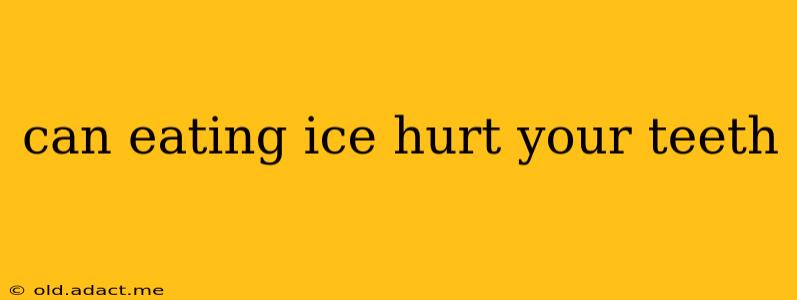The simple act of crunching on ice cubes might seem harmless, but can eating ice hurt your teeth? The answer, unfortunately, is a resounding yes. While an occasional ice cube might not cause immediate damage, the habit of regularly consuming ice can lead to a variety of dental problems. This article delves into the reasons why, exploring the potential consequences and offering advice on how to protect your pearly whites.
Why Does Eating Ice Hurt Your Teeth?
The primary reason ice is detrimental to your teeth is its extreme hardness. When you bite down on an ice cube, you're subjecting your tooth enamel – the hard outer layer protecting your teeth – to significant stress. This can lead to:
-
Fractured teeth: The force of biting into ice can cause cracks or chips in your teeth, often invisible to the naked eye initially. These micro-fractures can weaken your teeth over time, making them more susceptible to decay and further damage.
-
Enamel erosion: The constant cold temperature of ice can also contribute to enamel erosion. While not as immediate a threat as fracturing, prolonged exposure to extremely cold temperatures can weaken the enamel, making your teeth more sensitive and prone to cavities.
-
Increased tooth sensitivity: This is a common complaint among ice chewers. As the enamel weakens, the dentin (the layer beneath the enamel) becomes exposed, leading to heightened sensitivity to hot, cold, sweet, or sour foods and drinks.
What are the long-term effects of eating ice?
The cumulative effect of regularly chewing ice can be quite significant. Over time, these seemingly minor instances of damage can add up, leading to more serious dental issues requiring extensive and costly treatment. This might include:
-
Need for fillings or crowns: Cracks and chips can necessitate fillings to repair damaged teeth, or even crowns in more severe cases.
-
Root canals: If the damage extends to the tooth's pulp (the inner part containing nerves and blood vessels), a root canal may be necessary to save the tooth.
-
Tooth loss: In extreme cases, extensive damage caused by ice chewing can lead to tooth loss.
How can I stop chewing ice?
Many people chew ice due to a subconscious habit or an underlying condition like anemia or pica (a craving for non-nutritive substances). If you find yourself regularly chewing ice, here are some strategies to help break the habit:
-
Identify the underlying cause: If you suspect an underlying medical condition, consult your doctor.
-
Find alternative ways to satisfy the urge: Try chewing sugar-free gum or crunchy vegetables as a healthier alternative.
-
Keep ice out of reach: Make a conscious effort to remove ice from your immediate surroundings.
-
Practice mindfulness: Pay attention to your chewing habits and be aware of when you reach for ice.
Is it okay to occasionally eat ice?
Occasional ice consumption is unlikely to cause significant harm. However, regular or excessive ice chewing poses a serious risk to your dental health. Moderation is key.
Are there any health benefits to eating ice?
There are no proven health benefits to eating ice. In fact, the potential risks significantly outweigh any perceived advantages.
How can I protect my teeth from ice damage?
The best way to protect your teeth is to simply avoid chewing ice. If you have a craving for something cold, opt for chilled water or other refreshing beverages.
In conclusion, while the occasional ice cube might not cause immediate damage, consistently chewing ice can have severe consequences for your teeth. Protecting your oral health requires mindful habits and a conscious effort to avoid this potentially harmful practice. Remember, your smile is worth protecting!
